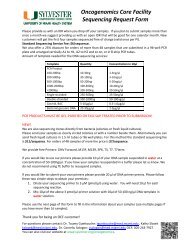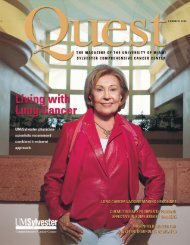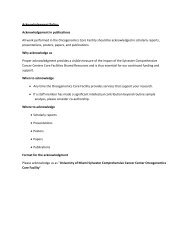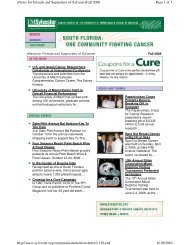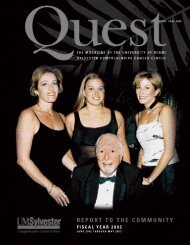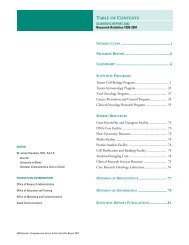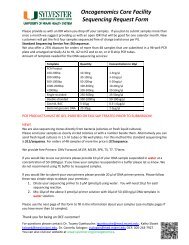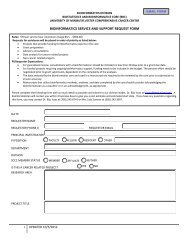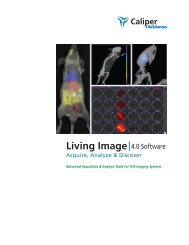SCIENTIFIC REPORT 2004 - Sylvester Comprehensive Cancer Center
SCIENTIFIC REPORT 2004 - Sylvester Comprehensive Cancer Center
SCIENTIFIC REPORT 2004 - Sylvester Comprehensive Cancer Center
Create successful ePaper yourself
Turn your PDF publications into a flip-book with our unique Google optimized e-Paper software.
T U M O R C E L L B I O L O G Y P R O G R A M<br />
T U M O R C E L L B I O L O G Y P R O G R A M<br />
PROGRAM LEADER<br />
Kermit L. Carraway, Ph.D.<br />
Professor of Cell Biology and Anatomy<br />
DESCRIPTION OF PROGRAM<br />
The Tumor Cell Biology Program currently<br />
comprises 28 faculty members in 11 different<br />
departments at the University of Miami<br />
School of Medicine. Faculty members are chosen<br />
based on the potential of their research to contribute<br />
to important aspects in the understanding<br />
of cancer cell biology. Faculty members must have<br />
peer-reviewed cancer related research funding in<br />
a field aligned with the scientific goals of the program<br />
or be newly recruited faculty investigators.<br />
GOALS OF PROGRAM<br />
The overall goal of the Tumor Cell Biology Program<br />
is to develop knowledge in the area of cell<br />
biology that can be applied to translational research<br />
on neoplastic disease. The focus of the individual<br />
studies varies widely, from gene therapy<br />
to the ultrastructural analyses of protein; however,<br />
all investigators are involved in cutting-edge<br />
research using the developing methods of molecular<br />
biology and cell structural analysis to ask<br />
questions important to tumor cell biology.<br />
The specific aims of the program are to:<br />
1) Understand how genetic information is maintained,<br />
transferred, and translated into functional<br />
cell proteins, a fundamental issue<br />
throughout the history of cancer research.<br />
2) Determine how tumor cells interact with other<br />
cells and their environment, particularly the<br />
molecular species and associations that favor or<br />
disfavor those interactions. This issue is critically<br />
important for understanding metastasis<br />
of tumors, the process that usually determines<br />
mortality of cancer patients.<br />
3) Determine how signaling pathways and<br />
molecules transmit and integrate information,<br />
which determines cell fate, including cell structure<br />
and function. Included in such analyses are<br />
the mechanisms by which the molecular components<br />
of signaling and metabolic pathways<br />
are localized in cells to perform their particular<br />
roles.<br />
All of these questions and approaches are important<br />
to understanding how tumor cells behave<br />
and determining whether specific tumor cell<br />
behaviors can be exploited in combating cancer.<br />
Developing such translational applications is the<br />
ultimate goal of the Tumor Cell Biology<br />
Program.<br />
PARTICIPANTS<br />
Burnstein, Kerry L., Ph.D.<br />
Molecular and Cellular Pharmacology<br />
Carraway, Kermit L., Ph.D.<br />
Cell Biology and Anatomy<br />
Deutscher, Murray P., Ph.D.<br />
Biochemistry and Molecular Biology<br />
D’Urso, Gennaro, Ph.D.<br />
Molecular and Cellular Pharmacology<br />
Fletcher, Terace M., Ph.D.<br />
Biochemistry and Molecular Biology<br />
Franzmann, Elizabeth J., M.D.<br />
Otolaryngology<br />
Han, Zhiyong, Ph.D.<br />
Biology<br />
Harris, Thomas K., Ph.D.<br />
Biochemistry and Molecular Biology<br />
King, Mary Lou, Ph.D.<br />
Cell Biology and Anatomy<br />
UM/<strong>Sylvester</strong> <strong>Comprehensive</strong> <strong>Cancer</strong> <strong>Center</strong> Scientific Report <strong>2004</strong> 65




